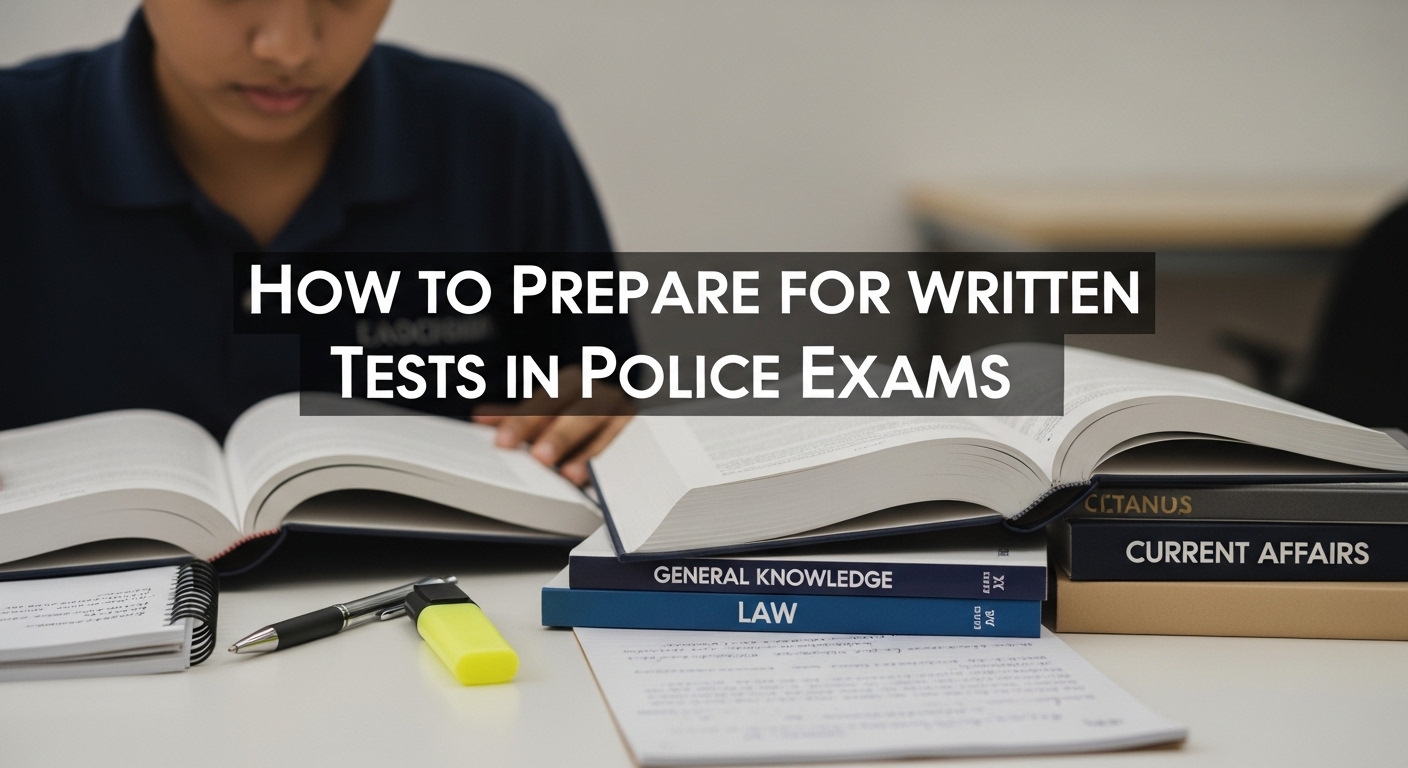Preparing the written test for police recruitment in Pakistan demands more than casual preparation, it requires deliberate planning, a clear understanding of the exam structure, and a consistent study routine tailored to the specific subjects and question types. The process begins by gaining a firm grasp of the exam format and content. Candidates must identify the specific requirements of their province, whether it’s Punjab, Sindh, Khyber Pakhtunkhwa, or Balochistan, as each might vary slightly in structure and focus.
The exams generally test a range of subjects, including general knowledge, English, Urdu, Islamic studies, mathematics, intelligence, and current affairs. The most common format includes multiple-choice questions, with some versions incorporating comprehension passages or short written responses. Early clarity on what to expect shapes the direction of your preparation and reduces wasted effort on irrelevant content.
Once the exam details are clear, the next phase revolves around building a smart and sustainable study plan. Effective preparation isn’t just about the number of hours spent; it’s about how that time is used. Setting daily and weekly goals helps maintain momentum, while prioritizing weaker subjects ensures balanced progress.
Integrating periodic revision and mock tests is essential to track performance and reinforce learning. Rather than aimlessly consuming material, candidates should use past papers and reliable guides to practice under conditions that simulate the actual test. Balance plays a key role here, study blocks should be broken up with rest to avoid burnout. Consistency, rather than cramming, forms the backbone of long-term retention and confidence. Including mental and physical wellness in this schedule is equally vital, as staying healthy supports focus and stamina during intense study periods and the exam itself.
The final stretch focuses on mastery, strategy, and readiness. Each subject area demands a focused approach: from strengthening grammar and comprehension for English and Urdu to brushing up on arithmetic and algebra for mathematics. Intelligence sections require regular exposure to logical patterns, while general knowledge and current affairs are best tackled through a mix of reading and quick-recall tools like quizzes or flashcards.
Practicing full-length tests trains candidates to manage time and pressure effectively. Equally important is preparing for the logistics of exam day—packing essentials in advance, sleeping well the night before, and arriving early at the center to settle nerves. The final days should revolve around quick revision, not learning new topics, to avoid unnecessary stress.
Taken together, this step-by-step process transforms what can seem like an overwhelming exam into a manageable, goal-oriented journey toward a police career.
Step 1: Understand the Exam Format and Syllabus
- Identify the Police Department and Exam Type: Pakistan’s provinces (Punjab, Sindh, Khyber Pakhtunkhwa, Balochistan) conduct their own police recruitment exams, each with specific formats and syllabi. Start by visiting the official police recruitment website or reading the latest recruitment advertisement carefully to get the exact syllabus and exam pattern.
- Download Official Syllabus and Past Papers: Obtain the official syllabus document and past exam papers if available. This helps in understanding the scope and difficulty level of the test.
- Break Down the Syllabus by Subject: Usually, the written test includes:
- General Knowledge (Pakistan’s history, geography, important personalities, current affairs)
- English Language (grammar, vocabulary, comprehension)
- Urdu Language (grammar, vocabulary, comprehension)
- Islamic Studies (basic knowledge of Islam, Quranic verses, Islamic history)
- Mathematics (arithmetic, algebra, percentages, ratios)
- Intelligence and Reasoning (logical reasoning, non-verbal intelligence)
- Current Affairs (national and international events, government policies)
- Understand the Exam Pattern: Most exams are MCQ-based, sometimes with short answer questions or essay writing. Know the number of questions, marks per question, total duration, and negative marking (if any).
Common Issues and Troubleshooting
- Issue: Confusion about the exact syllabus or exam pattern due to outdated or conflicting information.
- Solution: Always rely on the latest official notification from the police department’s recruitment portal. Join reputable online forums or social media groups where recent candidates share updated information.
- Issue: Overwhelmed by the vast syllabus.
- Solution: Break the syllabus into manageable chunks and prioritize topics based on weightage and your personal strengths/weaknesses.
Step 2: Create a Realistic and Structured Study Plan
- Set SMART Goals: Your study plan should be Specific, Measurable, Achievable, Realistic, and Time-bound. For example, “Complete Urdu grammar chapters 1-5 in 5 days,” or “Practice 3 full-length mock tests per week.”
- Daily and Weekly Time Allocation: Allocate fixed hours daily to each subject, balancing difficult and easy topics. For instance, spend more time on mathematics if it’s your weak area.
- Include Revision Days: Schedule weekly and monthly revision sessions to consolidate knowledge.
- Incorporate Practice Tests: Reserve time for solving past papers and mock tests under timed conditions.
- Plan Breaks and Rest: Avoid burnout by scheduling short daily breaks and at least one rest day per week.
Common Issues and Troubleshooting
- Issue: Difficulty sticking to the study schedule.
- Solution: Use digital tools like calendar apps or alarms to remind you. Keep the plan flexible enough to accommodate unforeseen events but firm enough to maintain discipline.
- Issue: Procrastination and loss of motivation.
- Solution: Set small rewards for achieving daily or weekly goals. Join study groups or find a study partner to keep each other accountable.
- Issue: Overloading study hours leading to fatigue.
- Solution: Follow the Pomodoro technique (25 minutes study, 5 minutes break) to maintain focus and energy.
Step 3: Gather Quality Study Materials
- Official Guides and Past Papers: Use recruitment-specific guides such as those by Dogar Brothers or others tailored for police exams in Pakistan.
- Online Resources: Websites like GoTest.pk provide extensive MCQs and quizzes for Urdu, Math, General Knowledge, and Non-Verbal Intelligence relevant to police exams.
- Books for Core Subjects: Select textbooks covering English grammar, Urdu grammar, Islamic Studies, and Mathematics aligned with the syllabus.
- Current Affairs Sources: Regularly read national newspapers (Dawn, The News), watch news channels, and follow reliable online portals for updates.
- Mobile Apps and Video Lectures: Use apps offering mock tests and video tutorials for difficult topics.
- Create Your Own Notes: Summarize important points, formulas, and vocabulary for quick revision.
Common Issues and Troubleshooting
- Issue: Difficulty finding authentic and updated study materials.
- Solution: Prefer official or well-reviewed materials recommended by recent successful candidates. Avoid outdated books or random internet sources.
- Issue: Getting distracted by too many resources.
- Solution: Stick to a limited number of trusted sources. Quality over quantity is key.
- Issue: Lack of access to physical books or coaching.
- Solution: Use free online resources and YouTube channels dedicated to police exam preparation.
Step 4: Master Each Subject Thoroughly
| Subject | Study Areas |
|---|---|
| General Knowledge & Current Affairs | Pakistan’s history, geography, political system, major events, important dates and facts, daily current affairs. |
| English Language | Grammar rules (tenses, parts of speech, sentence structure), vocabulary (word lists, synonyms/antonyms), comprehension, essay writing. |
| Urdu Language | Grammar rules, vocabulary, comprehension, essay writing. |
| Islamic Studies | Basic Islamic beliefs, life of Prophet Muhammad (PBUH), Quranic verses, Islamic history. |
| Mathematics | Arithmetic operations, percentages, ratios, averages, basic algebra. |
| Intelligence and Reasoning | Logical reasoning, analogies, series completion, pattern recognition, puzzles, non-verbal reasoning. |
Common Issues and Troubleshooting
Issue: Difficulty understanding complex topics or concepts.
Solution: Break down topics into smaller parts and use multiple resources (videos, books, tutors). Join online forums to ask questions.
Issue: Forgetting learned material over time.
Solution: Use spaced repetition techniques and regular revision.
Issue: Slow problem-solving speed, especially in math and reasoning.
Solution: Practice timed quizzes and focus on shortcuts and tricks.
Step 5: Practice with Mock Tests and Past Papers
- Simulate Exam Conditions: Take full-length mock tests in a quiet environment, timing yourself strictly.
- Use Online Test Series: Platforms like Testbook.com offer Punjab Police Constable test series with realistic exam interfaces.
- Analyze Results: Review wrong answers carefully to understand mistakes.
- Track Progress: Maintain a log of scores and improvement areas.
- Repeat Tests: Attempt the same tests multiple times to improve accuracy and speed.
Common Issues and Troubleshooting
- Issue: Anxiety and stress during mock tests.
- Solution: Practice relaxation techniques like deep breathing before tests. Start with shorter quizzes and gradually increase test length.
- Issue: Poor performance in initial mock tests leading to demotivation.
- Solution: Treat early mock tests as learning tools, not final judgment. Focus on gradual improvement.
- Issue: Not identifying weak areas properly.
- Solution: Use detailed test analytics (available on some platforms) to pinpoint specific topics needing attention.
Step 6: Develop Exam-Taking Strategies
- Time Management: Allocate time per question/section and stick to it.
- Question Prioritization: Answer easy questions first to secure marks quickly.
- Careful Reading: Read each question carefully to avoid silly mistakes.
- Eliminate Wrong Options: Use elimination techniques in MCQs to improve chances.
- Stay Calm: Maintain composure to think clearly under pressure.
Common Issues and Troubleshooting
- Issue: Running out of time before completing the test.
- Solution: Practice timed tests regularly and learn to move on from difficult questions quickly.
- Issue: Misreading questions or instructions.
- Solution: Develop a habit of reading questions twice before answering.
- Issue: Panic or loss of focus during the exam.
- Solution: Practice mindfulness and deep breathing exercises. Visualize success before the exam.
Step 7: Improve Physical and Mental Fitness
- Physical Fitness: Engage in regular exercise such as running, push-ups, and endurance training to prepare for physical tests and maintain overall health.
- Mental Health: Maintain a positive mindset, practice meditation or relaxation techniques, and avoid excessive stress.
- Healthy Lifestyle: Eat balanced meals, drink plenty of water, and get 7-8 hours of sleep daily.
Common Issues and Troubleshooting
- Issue: Fatigue and lack of concentration.
- Solution: Balance study with physical activity and rest. Avoid all-night study sessions.
- Issue: Stress and anxiety impacting performance.
- Solution: Seek support from family, friends, or counselors. Practice stress management techniques.
- Issue: Neglecting physical fitness.
- Solution: Incorporate short daily workouts and maintain consistency.
Step 8: Final Revision and Exam Day Preparation
- Revise Key Points: Use your concise notes and formula sheets for last-minute revision.
- Avoid New Topics: Do not start new subjects or topics just before the exam.
- Prepare Exam Essentials: Gather your ID, admit card, stationery, and water bottle the night before.
- Plan Your Route: Know the exact location of the exam center and plan to arrive early.
- Stay Calm and Confident: Get a good night’s sleep and eat a healthy breakfast on exam day.
Common Issues and Troubleshooting
- Issue: Last-minute panic or forgetting important points.
- Solution: Practice relaxation techniques and avoid cramming. Trust your preparation.
- Issue: Forgetting necessary documents or materials.
- Solution: Prepare a checklist and pack everything the night before.
- Issue: Getting stuck in traffic or arriving late.
- Solution: Leave home well in advance and have a backup plan for transportation.
Summary of Common Issues
| Step | Troubleshooting Tips |
|---|---|
Understanding Syllabus Confusion about syllabus, overwhelming content | Use official sources, join forums, break syllabus into chunks |
Study Planning Procrastination, burnout | Use alarms, reward system, Pomodoro technique |
Study Materials Finding authentic resources, distraction | Stick to trusted sources, limit materials |
Subject Mastery Difficulty understanding, forgetting | Use multiple resources, spaced repetition, ask questions |
Mock Tests Anxiety, poor initial performance | Practice relaxation, treat as learning, analyze mistakes |
Exam Strategies Time management, panic | Practice timed tests, read carefully, use elimination, mindfulness |
Physical/Mental Fitness Fatigue, stress, neglecting fitness | Balance study and rest, exercise, stress management |
Final Preparation Panic, forgetting essentials | Relaxation, checklist, early arrival |









